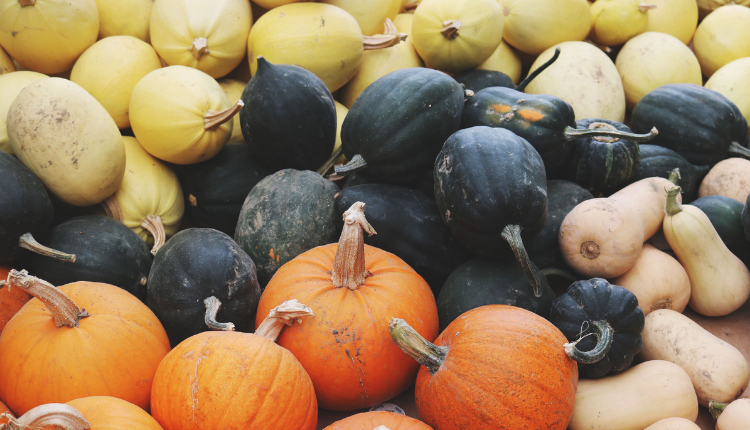Summer squash lovers need not worry! Winter squash grown in Maine come in many varieties and are tasty, simple to prepare and store, and offer many health benefits. Farmers typically harvest winter squash in the fall, including traditional New England favorites such as acorn, butternut and Hubbard squashes, as well as spaghetti squash and pumpkins.
Buying winter squash
The warm weather and occasional rain during the 2021 growing season means this was a great year for squash! The vegetable is abundant this time of year, and very affordable. If you store it in a cool, dark place, it will keep for months, so stock up now. Find mountains of squash at farm stands, farmers’ markets, and retail stores. Keep in mind:
- Look for firm, unblemished vegetables.
- Try different varieties – each one has a different flavor.
- Squash come in an endless range of sizes – find one that is right for your cooking needs.
- This is an adaptable vegetable: cook a large one on the weekend to serve as a side dish, add to soup or lasagna, or made into a warm fall dessert later in the week.
- If you’re planning to cook a squash in the next 2-3 weeks, use it as a decoration in the meantime! Many are pretty enough to serve in centerpieces.
Preparation tips
Unlike soft and delicate summer squashes (zucchini being a favorite), winter squashes have tough outer skins. This means they can be stored for a long time, but also makes them a little more challenging to prepare. (Follow these tips to cut winter squashes safely.) Prepare a simple squash side dish by roasting, boiling or even steaming the vegetable (making sure it is cooked thoroughly for an even texture), then adding seasoning and oil or butter to taste. It can also take center stage as a main dish ingredient, such as in Cheryl Wixson’s Butternut Squash with Caramelized Apples casserole, or Sarah Caron’s Butternut Squash soup. To spice it up, try this Butternut Squash and Chile Pan-Fry, from Maine SNAP-ED. Do you love spaghetti? Check out this great recipe for Spaghetti Squash on the Maine Senior FarmShare Program web page online at www.maine.gov/dacf/seniorfarmshare.
Edible seeds
You can also save the seeds that you scoop out of your winter squash for a healthy and delicious snack! Prepare the seeds as you would pumpkin seeds, separating them from the pulp, washing them carefully, then laying them in a single layer on a cookie sheet and baking at 160 to 170 degrees for about 15 to 20 minutes or until tender. (Add oil and salt for a little more flavor.)
Baking with squash
Squash is a flavorful addition to many recipes. One of our favorites is the squash roll recipe from the Maine Bicentennial Cookbook. For tips on cooking with squash and preparing the recipe, watch this video from the Dash of Maine Holiday Cooking Challenge series:
Nutrition benefits
Squash provides numerous health benefits that may help to reduce the risk of many diseases. Squash is a delicious and affordable addition to to a nutritious diet, offering these benefits:
- High levels of alpha-carotene and beta-carotene, which converts to Vitamin A
- Good source of Vitamin C
- Healthy source of fiber
- Antioxidant and anti-inflammatory compounds
- Polysaccharides that help regulate and/or control blood sugar
Any way you slice it, roast it, puree it, or snack on it, winter squash is a winner!

